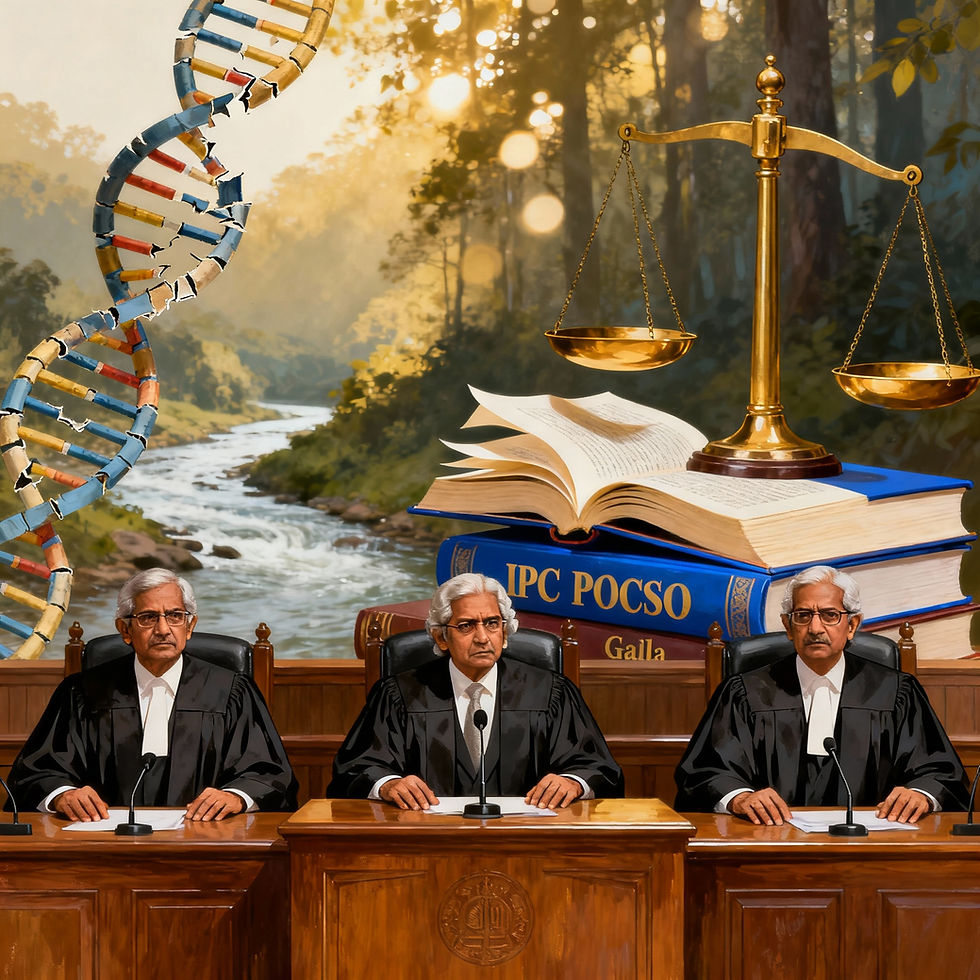SC Acquits Two Men in 2014 Minor Rape Case: A Forensic and Legal Breakdown
- Lawttorney.ai

- Sep 22, 2025
- 3 min read
Case Title: Akhtar Ali @ Ali Akhtar @ Shamim @ Raja Ustad v. State of Uttarakhand (Neutral Citation: 2025 INSC 1097)
Background – A Tragic Incident at the Wedding: The 2014 Minor Rape Case
In November 2014, a minor rape case shook Haldwani, Uttarakhand, when a young girl went missing during a family wedding. Her father, the informant, reported her disappearance after she failed to appear for a group photograph. Four days later, her body was discovered near the Gaula River in a forested area. The post-mortem revealed injuries consistent with sexual assault and blunt force trauma, leading to death by shock and haemorrhage.
Three men were accused in this minor rape case. The Trial Court acquitted one for lack of evidence, while the other two, namely Akhtar Ali and Prem Pal Verma, were convicted. Akhtar Ali was sentenced to death. The Uttarakhand High Court partially upheld their convictions, prompting the accused to file criminal appeals before the Supreme Court.

Trial and Conviction – Charges and Sentences
1. Akhtar Ali was convicted under:
IPC Sections 376A (rape causing death), 363 (kidnapping), and 201 (causing disappearance of evidence).
POCSO Act Sections 3–8.
Section 66C of the IT Act.
2. Prem Pal Verma was convicted under:
IPC Section 212 (harbouring an offender).
Section 66C of the IT Act.
He was also convicted for more serious charges like rape and conspiracy.
Forensic doubts – DNA evidence under scrutiny
The Supreme Court raised serious concerns about the reliability of the DNA evidence. The prosecution claimed that DNA found on the victim matched Akhtar Ali’s, but the Court found the report “ex facie doubtful”.
Key issues included:
The DNA expert’s qualifications: The witness held an M.Sc. in Botany and a Ph.D., with no specialization in human DNA profiling.
Procedural lapses in sample collection and analysis.
Lack of corroborative scientific rigour.
The Court concluded that the DNA report could not be treated as reliable evidence and should be excluded from consideration.
Circumstantial evidence – Broken links in the chain
The bench is comprised of three Judges Justices Vikram Nath, Sanjay Karol, and Sandeep Mehta. They emphasized that in such circumstantial evidence cases, the link must be conclusively and firmly established.
There were three major flaws in this case –
The prosecution failed to provide credible evidence but alleged lust as the motive.
The proximity and timeline were not convincingly established.
The DNA report was riddled with inconsistencies.
The Court reiterated that where two views are possible, the one favouring the accused must be adopted.
Death Penalty – A call for Judicial caution
The judgement strongly warned against the mechanical dictate of the death penalty.
It said that:
“Trial Courts, as well as High Courts, are required to exercise the highest degree of circumspection before awarding the death penalty.”
The irreversible nature of capital punishment demands that it be reserved for the “rarest of rare” cases, and only when guilt is proven beyond doubt. In this case, the Court found that the prosecution’s evidence failed to meet that threshold.
Legal Representation
Advocate Manisha Bhandari appeared on behalf of the Appellants.
AOR Vanshaja Shukla represented the State.
The arguments led by both parties helped in lighting the procedural and evidentiary gaps that gradually led to the acquittal.
Way forward – Acquittal based on legal principles
Setting aside the High Court’s Judgement, the Supreme Court allowed the appeals. It held that the prosecution failed to establish a reliable and unbreakable chain of circumstances pointing to the accused's guilt.
“Given the above infirmities, the so-called links in the chain of circumstances stand broken. The prosecution has, therefore, failed to prove the guilt of the accused-appellants beyond a reasonable doubt.”
Empower Your Legal Practice with AI – Join Our Free Webinar!
Are you a legal professional looking to boost your efficiency and stay ahead in a competitive field? Discover the power of Lawttorney.AI – the cutting-edge tool designed to streamline legal research, automate tasks, and enhance productivity.
👉 Don't miss out! Reserve your spot in our FREE webinar and experience the future of legal practice today. Register Now



Comments